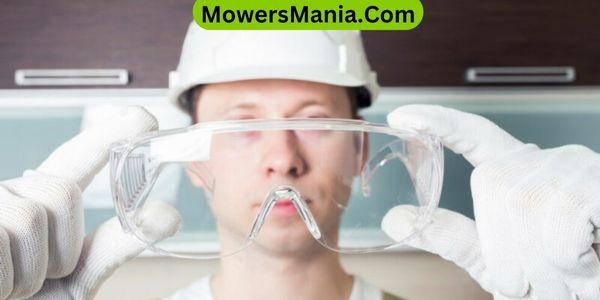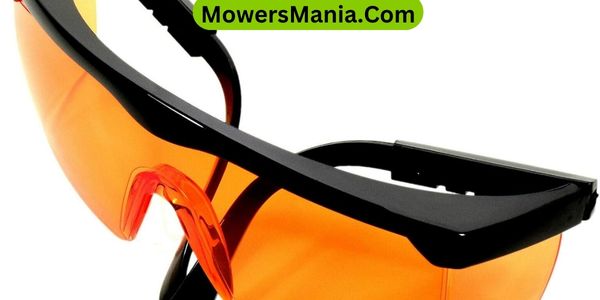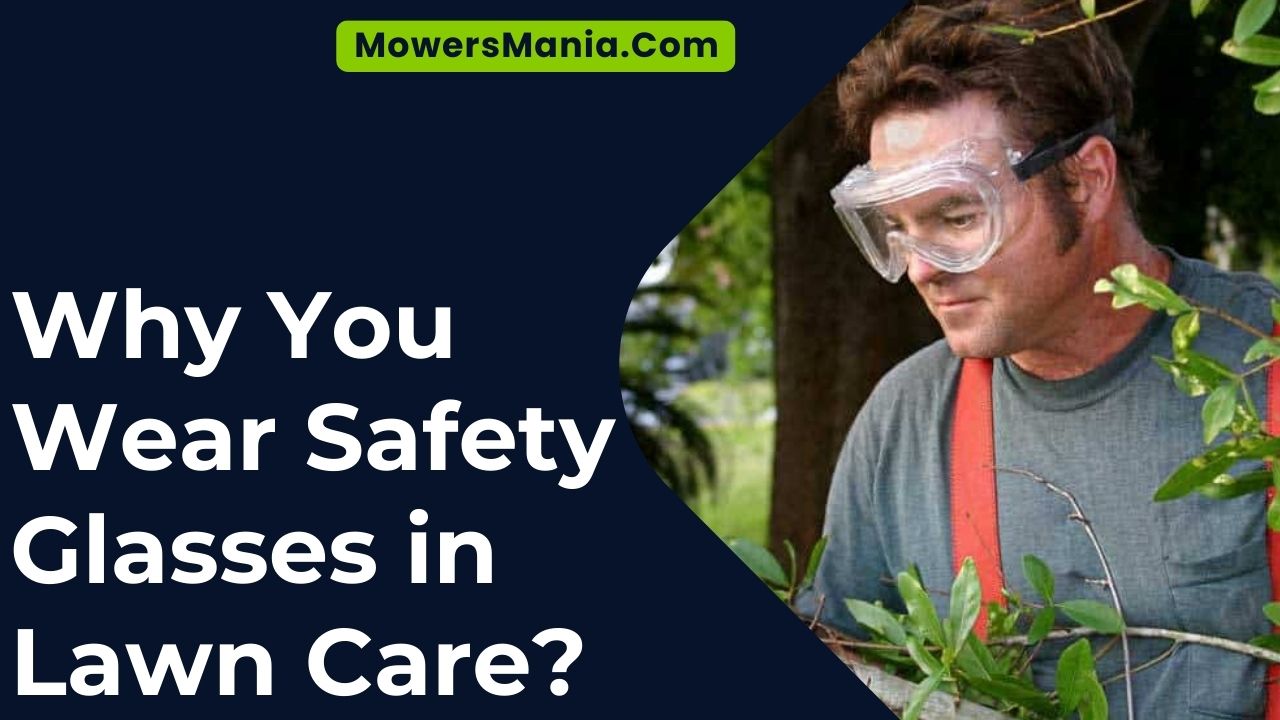When tending to your turf, the temptation to skip safety glasses may seem trivial, but the truth is, the risks are real.
The potential for flying debris and harmful chemical exposure can pose serious threats to your eyes. You may think it won’t happen to you, but the consequences of neglecting proper eye protection could be severe.

So, why exactly should you prioritize safety glasses in your lawn care routine? Keep reading to discover the impact of flying debris and harmful chemical exposure, and how safety glasses can prevent eye injuries, emphasizing the importance of proper eye protection in lawn care.
Potential Risks in Lawn Care
When operating lawn care equipment, always be aware of potential risks to your safety.
Lawn care involves working with sharp blades, powerful motors, and potentially harmful chemicals. One of the main risks is the potential for flying debris, such as rocks or twigs, which can be propelled at high speeds by lawnmowers or trimmers. These objects can cause serious eye injuries if proper eye protection isn’t worn.
In addition, the blades of the equipment can cause cuts or lacerations if not handled carefully. Another risk to consider is the loud noise produced by some lawn care equipment, which can lead to hearing damage if ear protection isn’t used.
Furthermore, the use of chemicals such as fertilizers and pesticides poses a risk of skin irritation or poisoning if not handled correctly.
Being mindful of these potential risks and taking appropriate safety measures, such as wearing safety glasses, gloves, ear protection, and protective clothing, is crucial to prevent accidents and ensure a safe lawn care experience.
Impact of Flying Debris
To safeguard your eyes from potential injury while operating lawn care equipment, wearing safety glasses is essential, especially when considering the impact of flying debris.
Lawn mowers, trimmers, and other power tools used in lawn care can propel rocks, sticks, and other objects at high speeds.
Without safety glasses, these airborne particles can easily cause serious eye injuries. Even small debris can cause corneal abrasions or lacerations if it makes direct contact with the eye.
The force of impact from larger objects can result in more severe injuries, including blunt trauma or even permanent vision loss.
Additionally, flying debris may also carry harmful chemicals or pesticides, posing a risk of chemical exposure to the eyes.
This underscores the importance of wearing safety glasses with side shields to provide full coverage and protection.
By wearing safety glasses, you’re effectively minimizing the risk of eye injuries from flying debris, allowing you to focus on completing your lawn care tasks safely and with peace of mind.
Harmful Chemical Exposure

Protect your eyes from potential chemical exposure by wearing safety glasses with side shields while performing lawn care tasks.
Chemicals commonly used in lawn care, such as fertilizers, pesticides, and herbicides, can pose serious risks to your eyes if they come into contact with them.
These substances can cause irritation, burning, or even more severe damage if they splash or spray into your eyes.
Wearing safety glasses provides a barrier of protection, reducing the risk of harmful substances reaching your eyes and causing injury.
The following table illustrates some common chemicals used in lawn care and their potential effects on the eyes:
| Chemical | Potential Eye Effects |
|---|---|
| Fertilizers | Irritation, burning |
| Pesticides | Irritation, redness, burning |
| Herbicides | Irritation, blurred vision |
As shown in the table, these chemicals can cause a range of adverse effects on the eyes, emphasizing the importance of wearing safety glasses to mitigate the risk of exposure. By taking this simple precaution, you can safeguard your eyes from potential harm while tending to your lawn.
Preventing Eye Injuries
While safeguarding your eyes from harmful chemical exposure during lawn care, it’s essential to take proactive steps in preventing eye injuries.
Here are some crucial tips to keep your eyes safe while working in the yard:
- Wear protective eyewear: Always use safety glasses or goggles specifically designed to provide eye protection. Ensure that they fit properly and have side shields for maximum coverage.
- Clear the work area: Before starting any lawn care activity, remove any debris, sticks, or stones that could potentially fly up and cause eye injuries during mowing or trimming.
- Use caution with chemicals: When using fertilizers, pesticides, or other chemicals, read and follow the instructions carefully. Wear protective gloves and eyewear to prevent accidental splashes or fumes from coming into contact with your eyes.
- Maintain equipment: Regularly inspect and maintain your lawn care equipment to prevent malfunctions that could lead to flying debris or other hazards. This includes keeping blades sharp and secure on mowers and trimmers.
Importance of Proper Eye Protection

When working in lawn care, safeguarding your eyes with proper protective eyewear is crucial for preventing potential injuries.
Lawn care activities such as mowing, trimming, and edging can propel debris into the air, posing a serious risk to your eyes.
Without proper eye protection, small rocks, twigs, and other debris can cause painful and potentially sight-threatening injuries.
Wearing safety glasses or goggles shields your eyes from flying objects, reducing the risk of scratches, cuts, and more severe injuries.
Moreover, exposure to harmful chemicals in fertilizers, pesticides, and herbicides can also lead to eye irritation and damage.
Quality safety glasses provide a barrier against these chemicals, ensuring your eyes are protected from potential harm.
Frequently Asked Questions [FAQs]
Are There Specific Safety Glasses Designed for People With Prescription Eyewear?
Yes, there are safety glasses designed for people with prescription eyewear. They provide the necessary protection while accommodating your prescription. These glasses are a practical solution for maintaining clear vision and safety.
Can Wearing Safety Glasses Prevent Eye Fatigue During Long Hours of Lawn Care Work?
Wearing safety glasses during long hours of lawn care work can prevent eye fatigue by reducing strain from debris and UV exposure. They provide protection and comfort, allowing you to focus on your task.
What Are Some Common Misconceptions About the Effectiveness of Safety Glasses in Preventing Eye Injuries?
Common misconceptions about safety glasses include thinking they are unnecessary for quick tasks, only for industrial settings, or that regular glasses offer the same protection. However, safety glasses are crucial for preventing eye injuries.
How Often Should Safety Glasses Be Replaced to Ensure Optimal Protection?
You should replace safety glasses every 1-2 years for optimal protection. Regularly check for scratches, cracks, or damage, and replace them if any are found. Proper maintenance and timely replacement ensure your eyes are always protected.
Are There Any Regulations or Guidelines for the Use of Safety Glasses in Lawn Care?
When doing lawn care, follow regulations and guidelines for wearing safety glasses. They protect your eyes from flying debris, chemicals, and UV rays. Regularly check for damage and replace as needed to ensure optimal protection.
Conclusion
So, next time you head out to do some lawn care, make sure to grab your safety glasses. They may seem like a small inconvenience, but they can protect your eyes from flying debris and harmful chemicals.
It’s better to be safe than sorry when it comes to your vision. Keep those safety glasses handy and enjoy your time outdoors without worrying about potential eye injuries.



